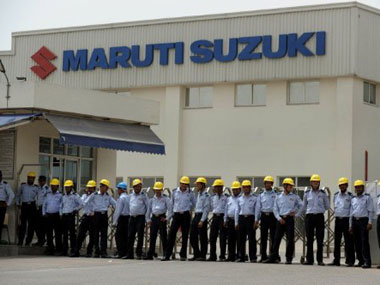The initial shock of discovering that some striking labour union members, including the ex-president of the Maruti Suzuki Employees Union, Sonu Gujjar, had left the company after receiving hefty severance packages has given way to increasing criticism over how the whole affair was handled by Maruti.
A Business Standard report on Monday said that institutional investors in Maruti Suzuki, India’s largest car-maker, are disgruntled at the lack of communiciation from the company on the severance packages, which reports said ranged between Rs 14 lakh and Rs 40 lakh per person.
Indeed, it took a report in The Economic Times for the rest of the world to find out about the payoffs.
[caption id=“attachment_124981” align=“alignleft” width=“380” caption=“While investors acknowledged that there is no legal obligation for Maruti Suzuki to inform shareholders of its actions, they believe it should done so for the sake of good corporate governance.”]  [/caption]
While investors acknowledged that there is no legal obligation for Maruti Suzuki to inform shareholders of its actions, they believe it should done so for the sake of good corporate governance.
Gujjar was among the leaders spearheading the labour agitation, so why didn’t Maruti think it was important to quickly inform shareholders that he had left the company with a hefty pay off? The lack of communication, in fact, has give rise to charges that the company actually “bribed” Gujjar and Co to end the strike.
Institutional investors, not surprisingly, are unhappy with the entire arrangement, pointing out that paying off labour union leaders to end a strike is not the way to go about dealing with such unrest.
Impact Shorts
More ShortsSadly, it also does little to burnish the reputation of Gujjar, with whom institutional investors even had a conference call to understand the striking workers’ point of view. "..now we learn he took some money from the management and vanished. Who do we trust?" asked one of the investors, who did not wish to be named, according to Business Standard. Indeed, the rest of the striking workers who were left in the lurch will be asking the same question.
Trust is a commodity in increasingly short supply not just among investors but also with consumers of some high-profile companies in recent times.
Most Blackberry users in India will remember all too clearly how there was absolutely no word from Research in Motion’s (RIM) top management even after a severe service outage struck four continents for nearly four straight days. Didn’t consumers and shareholders have a right to know what was going on? Most commentators were shocked by the company’s stubborn silence on the issue even as hapless users struggled with non-functional devices.
In another high-profile incident, Crompton Greaves came under fire from institutional shareholders after the management bought an aircraft at a time when its profits were under pressure.
And in another instance of corporate misgovernance coming to light, Lilliput Kidswear had to defer its initial public offering after private equity investors raised questions about certain “irregularities” in the company’s financial statements.
Kingfisher Airlines also came under the investor radar after auditors noted in their report that the company’s net worth had been “completely eroded” and its ability to survive depended on the company’s ability to raise more cash. Nomura Securities also downgraded one of the group companies, United Spirits, after referring to the inappropriate manner in which cash was being transferred in and out of the group’s holding companies.
And of course, who can forget the grand-daddy of corporate misgovernance, Satyam? Late last week, Satyam promoter B Ramalinga Raju was granted bail after nearly three years in custody. The strange thing is, the scam did not begin by the auditors or the investigative agencies catching Raju doing the dirty. It came from Raju himself, when he sent a letter of confession on 7 January 2009 to the stock exchanges and the company’s board saying he had cheated shareholders by overstating profits and cash balances and understating liabilities.
Yet, as a _Firstpost_ article noted, Central Bureau of Investigation (CBI) is so incompetent that it cannot catch a self-confessed white collar criminal and get him convicted in double-quick time.
Indeed, very few companies in India get penalised for inappropriate corporate behaviour. With even the authorities going slow on punishing offenders, shareholders have few options at their disposal to correct any management wrongdoings.
In the rare case of Crompton Greaves, the outrage among shareholders forced the company to sell back the aircraft. But the truth is that in the vast majority of cases, shareholders are simply silent spectators in companies that just don’t seem to care about their rights.
Apallingly, Maruti, India’s largest car-maker, risks falling into that category of companies.


)

)
)
)
)
)
)
)
)



